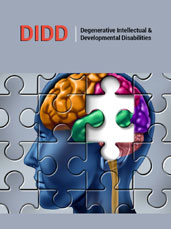- Submissions

Full Text
Degenerative Intellectual & Developmental Disabilities
Emotional Issues are More Evident Among Youngsters; Need to Address for Healthy Behaviour Management
Asma Perveen*, Pau Kee and Hazalizah Hamzah
Sultan Idris University of Education, Malaysia
*Corresponding author: Asma Perveen, Senior lecturers, Sultan Idris University of Education, Malaysia
Submission: March 20, 2018; Published: August 10, 2018

Volume1 Issue5 August 2018
Mini Review
Young generations today are beyond control of parents, teachers and families. Different countries used different terms to describe this group where some used the term of ‘beyond parental control’ while some label them as ‘disobedient’, ‘incorrigible’, ‘unruly’ or ‘ungovernable’ and in addition, this social illness among young generations needs attention of many parties due to the linkage between their behaviour and the potential for delinquent and later adult criminal acts. Whatever different term we used to describe this group, but they still have common characteristics which is uncontrollable behaviour. Hashim (2007) stated that “Malaysian teenagers, in general, face various life challenges and experience distress. They are at risk of becoming dissatisfied and unhappy teenagers and may choose to become involved in negative activities such as gangsterism, bullying, drug abuse, sexual misconduct, and crime”. According to the World Health Organization (WHO) adolescent is defined as individuals between 10 and 19 years, while youth is between 15 and 24 years and young people is defined between 10 and 24 years old.
Many quantitative and qualitative based researches on problems in adolescents have been conducted locally and in other countries to help in preventing young generation from social problem. As mentioned previously, research proven that emotional intelligence can helps in reducing problems among adolescents. A study was carried out by Shumaila Azeem & Bushra Hassan (2014) on the relationship between emotional intelligence and self-reported delinquency among college boys. Based on the news reported in newspapers and other social mediums, social problems among adolescent in Malaysia is on rising and needs to be addressed necessarily. Numerous numbers of social problems happen today that start from less serious cases such as come late to school, skip class , disobeyed school rules, followed by serious cases such as disobey teachers, smoking, illegal racing, gangsters and bully and finally to most serious cases such as involving in sexual activities, pregnant out of wet lock, baby dumping and rape that has been reported by the mass media almost every day (Tunggak, Ngadi, & Abu Naim, 2015). Statement from Malaysian Welfare Department revealed that juvenile cases from year 2009 to 2013 involving under age male offenders is 23, 950 and female offenders is 1828 (Che Mohd Nasir & Mohd Ali Hanafiah, 2015). Therefore, it is quite challenging to handle such numerous number of adolescent involving in problems in Malaysia. In according to this, many areas related to adolescent delinquent problems have been investigated by researchers (Choon, Hasbullah, Ahmad, & Ling, 2013).
Many past studies concluded that low level of emotional intelligence can contribute to problems among adolescent. A recent study on adolescent delinquency was conducted by Abdullah, Lee, Roslan, & Baba (2015) that found that adolescents with better emotional intelligence had lower levels of delinquency. To understand the specific problems among youngster, researcher visited the juvenile delinquency centres in different states of Malaysia, like correctional institutions (Sekolah Tunas Bakti) Melaka, Penang, Taping and Terengganu. After permission from each state, we prepared the interview protocols. Questions were open ended and related to emotional problems. Results analysis revealed that most of the responded revealed emotional issues, sadness, anger, stress, worry, feeling of emptiness, left alone, boredom, and lack of self esteem. The revealed social issues like lack of interactions, parental neglecting, conflicts with others and feeling of being suppressed and stressed by family and friends. They revealed that their peer influenced them much toward unhealthy behaviour like using drugs and unsafe sexual relationships.
All of these problems are suggesting to work to develop a helping module for youngster to have better understanding for emotional issues and healthy management plans for psychological perceptive. Therefore, improving the quality of life among adolescent is imperative. Current study aims to produce Emotional Competency Module based on Goleman’s Emotional Intelligence Theory that mainly focused on 4 aspects that includes Self-awareness, Selfmanagement, Relationship Management and Social Awareness. This study will describe the comprehensive step by step processes of module development.
© 2018 Asma Perveen. This is an open access article distributed under the terms of the Creative Commons Attribution License , which permits unrestricted use, distribution, and build upon your work non-commercially.
 a Creative Commons Attribution 4.0 International License. Based on a work at www.crimsonpublishers.com.
Best viewed in
a Creative Commons Attribution 4.0 International License. Based on a work at www.crimsonpublishers.com.
Best viewed in 







.jpg)






























 Editorial Board Registrations
Editorial Board Registrations Submit your Article
Submit your Article Refer a Friend
Refer a Friend Advertise With Us
Advertise With Us
.jpg)






.jpg)














.bmp)
.jpg)
.png)
.jpg)










.jpg)






.png)

.png)



.png)






